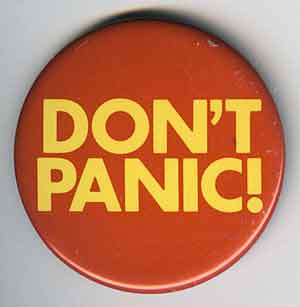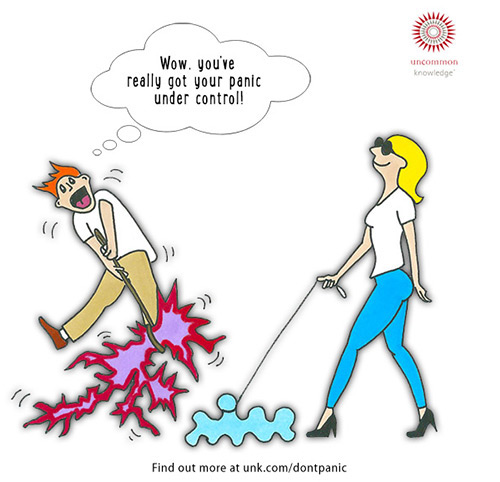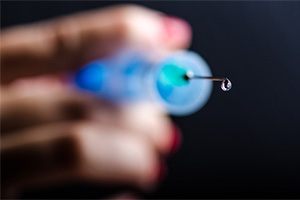7 Steps to Stop a Panic Attack
Tried and tested ways to stop panic attacks spoiling your life
 "7 Steps to Stop a Panic Attack" courtesy of Jim Linwood
"7 Steps to Stop a Panic Attack" courtesy of Jim LinwoodShe sat in her car and sobbed. The panic had passed, but she was exhausted and terrified it would start again. That's the thing about panic attacks: they come and go quickly, usually building to their peak within ten minutes, but while they last, they're intense and exhausting.
"One moment I was driving along thinking about work. The next, I felt like I was going to die! I got really hot, started breathing hard, began to sweat, became tearful, and my pounding heart felt like it was going to burst!" She trembled as she spoke; even recalling it made her tearful.
That had been Kathy's first panic attack, a few months before she came to see me, and since then she'd had many more. "I used to be bubbly, fun-loving, confident! Now I don't want to go out in case I panic."
When you overcome panic attacks, you get your life back. Those horrible feelings either go completely or become easily controllable. But Kathy didn't really believe her panic attacks would ever stop. They felt so powerful. She needed reassurance fast.
What causes panic attacks?
She was at a loss. "Why me?"
Panic attacks often start during times of higher than normal stress in life. It could be a build-up of many things. The high 'background stress' can 'overspill' into a panic.
Kathy's panic attacks started after a career change, her mother was ill, and she was having problems in her relationships. She had been driving along, fretting about her new job, and suddenly all that stress bubbled over and she panicked. "I actually felt more terrified than I'd ever felt in my life."
But let's look at the term 'panic attack' because I reckon those are a very unhelpful couple of words:
Panic attacks: A cruel label?
"'Panic attack' is actually a misnomer," I told her, "since nothing is 'attacked'." A house alarm doesn't 'attack' the house it's protecting, but it can sound when it doesn't need to. Stopping panic attacks isn't about getting rid of all panic; it's about aligning it so it only happens when it really needs to.
The scary changes (fast breathing, sweating, raised heartbeat, shaking) would all feel perfectly natural if you were running in the gym. Really, a panic attack is the body behaving as if it's exercising when it's not.
All the 'weird symptoms' are completely normal in the right circumstances.
Fast breathing, raised pulse: Your body produces these responses to help you exercise. It only feels weird if you are not exercising when they happen.
Sweaty palms: When the sweat dries, you'll have better grip in your hands to climb trees or hold weapons.
Feeling the need to vomit or defecate (sorry to bring that up : ) ): Both, if you were covered in them (YUCK!), would help put off a potential predator from eating you!
So these are all, in very extreme circumstances, useful reactions. But if they happen when we're driving, sitting in a restaurant, or taking the kids to school, then of course they feel weird.
Kathy felt reassured that she wasn't 'crazy'; that, in their place, panic attacks are normal, even useful. After looking at some of the ways she could stop panicking about panic attacks, we looked at what we could do to actually stop them.
1) Let the panic know who's boss
"Stopping panic attacks is all about taking back control. To help beat panic attacks, I want you to think about them in a very specific way," I told Kathy.
Panic is powerful but stupid. We're all born with the capacity to panic, but panic is 'blind'. That means it doesn't know what to fear, so it takes its lead from you. If you avoid or run from something (say, the library in which the panic attack happens), then your panic response will tag that place as threatening.
If the panic gets just one hint that a situation is really not dangerous, it will 'call back' its big investment of energy. Breathing will slow down again, blood pressure will return to normal, the sweat response will calm down, and clear thought will return. Like fire fighters returning to their depot after discovering that it was a false alarm.
So you can let your panic know it's not needed by practicing the next tip:
2) Stop running to stop panic attacks
If you panic in a supermarket and flee the scene, then your panic response will conclude that the supermarket holds life-threatening horrors because you ran away from it. It will try to be 'more helpful' by spreading the fear to perhaps all supermarkets or even all situations that have lots of people in them, a bit like supermarkets.
If you panic but stay in the situation until you calm down, your panic response will learn that it's not the situation causing the panic. In nature, we avoid what is dangerous. And the more you avoid something, the bigger the fear builds.
The more 'normal' you act, the more panic gets the message it's not needed. By imagining being in a situation in which you fear you might panic whilst you are relaxed, you teach your mind and body to feel relaxed about being in the situation for real. See the free audio that comes with this article.
The next tip shows you how to control breathing - often the fist physical change before a panic attack starts.
3) A breath of fresh air
When we panic, we breathe quickly and high in the chest. This is because your body wrongly assumes it needs to exercise and so breathes as if you were running hard. When we breathe in this way when we are not exercising, we may call this hyperventilation.
Hyperventilation is not serious, but it feels dramatic. Symptoms of hyperventilation include light-headedness, giddiness, shortness of breath, heart palpitations, and feelings of weakness.
"Yes," said Kathy, "I feel like I can't breathe!" It may feel as if you haven't got enough air, but this feeling actually occurs because you have been taking in too much.
To 'switch off' hyperventilation you can:
- Hold your breath. Really? Am I kidding? Seriously, holding the breath for as long as you comfortably can will prevent the dissipation of carbon dioxide. The feeling of not having enough air isn't caused by not breathing in enough oxygen but by breathing out too much; so holding your breath prevents this happening. A period of ten to fifteen seconds, repeated a few times, is sufficient. This will 're-set' your breathing to normal.
- Then do deep diaphragmatic breathing: slow, deep breathing right down to the bottom of the lungs. Breathing should be through the nose, with the out-breath taking longer than the in-breath. You can quick count in your mind to 7 as you breathe in and 11 as you breathe out (the 7-11 breathing technique). Practice this everyday to get very good at relaxed breathing - because it's impossible to breath like this and panic at the same time.
4) Stop panic attacks by 'acting normal'
"So Kathy, if you do have another panic attack, I want you to make a conscious effort to carry on as if nothing out of the ordinary is happening. Pretty soon the panic will 'get bored', realize it's not actually needed, and drift away."
You wouldn't carry on talking if a hungry lion was about to pounce on you. So keep talking - keep acting as if nothing untoward is happening. You may not feel like 'acting normal', but remember your panic is pretty dumb (even if you have a PhD in astrophysics) and is looking for cues from you as to whether it's needed or not.
With that in mind, on to the next tip.
5) Keep thinking
Keep thinking or doing something that is methodical. During times when panic is really required (a hungry, fractious lion coming right at you), the thinking part of the brain becomes much less active. This happens because we need to become purely physical - to run or to fight.
But if you purposefully start counting backwards from one hundred in jumps of three - '100, 97, 94, 91...etc.' - you force your thinking brain to work, which actually dilutes the panic response. Making yourself do a crossword or read the paper, even grading your own anxiety from one to ten - all force your thinking brain to work, which again sends the message: "This is not a real emergency, so butt out!"
Kathy actually did this. She thought she might panic (again when driving), so she started to count backwards and very soon found that she felt normal again.
6) Use the AWARE technique
I gave Kathy a little card we call the AWARE card. (Make one for yourself.) She was to carry it around with her and, if she started to feel panicky, to take it out, read it, and follow the simple instructions:
A: Accept the anxiety. Don't try to fight it.
W: Watch the anxiety. Imagine it is outside of you and you are just observing it.
A: 'Act normal'. Carry on as if nothing is happening. Panic will soon 'get bored'.
R: Repeat the above steps until you start to relax again.
E: Expect the best - it will pass quicker and quicker the more times you do this.
Write these steps down on a card and if you ever feel you might panic, take them out, follow them, and you'll soon calm down.
Now the last tip is perhaps the most powerful.
7) Prepare not to panic
"This is all good advice!" said Kathy. "And I do feel a bit better. But in the heat of the moment, I'll know I'll forget it all!"
This is why I worked hypnotically with Kathy. Sure she could use all the above (and she did), but we wanted her mind and body to naturally feel calm again.
Mental rehearsal whilst very relaxed helps automatically re-jig your responses so that calm naturally starts to replace panic. You just start to find you naturally feel more relaxed.
The best way to do this is to relax deeply with your eyes closed, imagine being in a situation in which you fear you might panic, and just see yourself controlling it; even enjoying the situation and forgetting to think about panic.
Panic is fuelled by misuse of the imagination, so learn to use your imagination productively.
Your panic attacks can be stopped in their tracks; in fact, they want to be. Your body doesn't want to waste needless energy. Use these 7 tips and techniques and before long, you'll have your first experience of stopping a panic attack before it even gets started. And that will be a very, very nice feeling indeed.
For Kathy, panic attacks were a phase in her life; a phase that has stopped.







